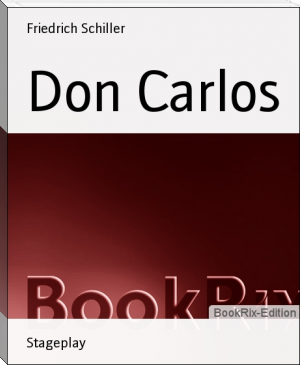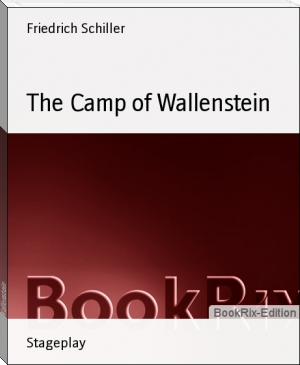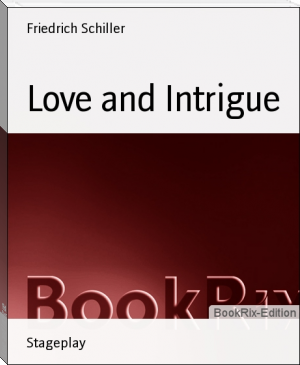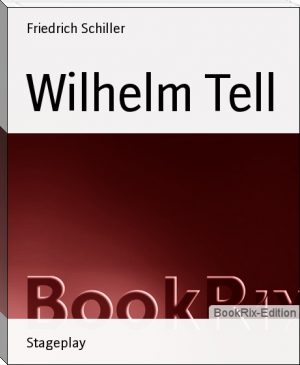Fiesco, Friedrich Schiller [uplifting novels .TXT] 📗

- Author: Friedrich Schiller
Book online «Fiesco, Friedrich Schiller [uplifting novels .TXT] 📗». Author Friedrich Schiller
were they able, would forsake their office in order to follow his glorious banner, though by so doing they abandoned Genoa to the mercy of the ocean. What might shake death himself out of his leaden sleep has not power to rouse thy courage? Away! I'll find my way alone.
ARABELLA. Great God! You will not act thus madly?
LEONORA (with heroic haughtiness). Weak girl! I will. (With great animation.) Where the tumult rages the most fiercely. Where Fiesco himself leads on the combat. Methinks I hear them ask, "Is that Lavagna, the unconquered hero, who with his sword decides the fate of Genoa? Is that Lavagna?" Yes, I will say; yes, Genoese, that is Lavagna; and that Lavagna is my husband!
SACCO (entering with CONSPIRATORS). Who goes there - Doria or Fiesco?
LEONORA (with enthusiasm). Fiesco and liberty. (Retires into another street. A tumult, ARABELLA lost in the crowd.)
SCENE VI.
SACCO, with a number of followers. CALCAGNO,
meeting him with others.
CALCAGNO. Andreas has escaped.
SACCO. Unwelcome tidings to Fiesco.
CALCAGNO. Those Germans fight like furies! They planted themselves around the old man like rocks. I could not even get a glimpse of him. Nine of our men are done for; I myself was slightly wounded. Zounds! If they thus serve a foreign tyrant, how will they guard the princes of their country?
SACCO. Numbers have flocked already to our standard, and all the gates are ours.
CALCAGNO. I hear they still are fighting desperately at the citadel.
SACCO. Bourgognino is amongst them. Where is Verrina?
CALCAGNO. He guards, like Cerberus, the passage between Genoa and the sea - an anchovy could scarcely pass him.
SACCO. I'll rouse the suburbs - -
CALCAGNO. I'll away to the market-place. Drummers, strike up! (They march off, drums beating.)
SCENE VII.
MOOR. A troop of THIEVES, with lighted matches.
MOOR. Now I'll let you into a secret, my boys; 'twas I that cooked this soup, but the devil a spoonful do they give me. Well, I care not. This hubbub is just to my taste. We'll set about burning and plundering. While they are squabbling for a dukedom we'll make a bonfire in the churches that shall warm the frozen apostles. (They disperse themselves among the neighboring houses.)
SCENE VIII.
BOURGOGNINO - BERTHA, disguised as a boy.
BOURGOGNINO. Rest here, dear youth; thou art in safety. Dost thou bleed?
BERTHA (in a feigned voice). No; not at all.
BOURGOGNINO (with energy). Rise, then, I'll lead thee where thou mayst gain wounds for Genoa - wounds beautiful like these. (Uncovering his arm.)
BERTHA (starting). Heavens!
BOURGOGNINO. Art thou frightened, youth? Too early didst thou put on the man. What age hast thou?
BERTHA. Fifteen years.
BOURGOGNINO. That is unfortunate! For this night's business thou art five years too young. Who is thy father?
BERTHA. The truest citizen in Genoa.
BOURGOGNINO. Gently, boy! That name belongs alone to the father of my betrothed bride. Dost thou know the house of Verrina?
BERTHA. I should think so.
BOURGOGNINO (eagerly). And knowest thou his lovely daughter?
BERTHA. Her name is Bertha.
BOURGOGNINO. Go, quickly! Carry her this ring. Say it shall be our wedding-ring; and tell her the blue crest fights bravely. Now farewell! I must hasten yonder. The danger is not yet over. (Some houses are seen on fire.)
BERTHA (in a soft voice). Scipio!
BOURGOGNINO (struck with astonishment). By my sword! I know that voice.
BERTHA (falling upon his neck). By my heart! I am well known here.
BOURGOGNINO. Bertha! (Alarm-bells sound in the suburbs - a tumult - BOURGOGNINO and BERTHA embrace, and are lost in the crowd.) [NOTE]
[NOTE] In lieu of this scene Schiller substituted the following, during his stay at Leipzig in 1786, for the use of the theatre there: -
A subterranean vault, lighted by a single lamp. The background
remains quite dark. BERTHA is discovered sitting on a stone in
the foreground; a black veil covers her face. After a pause she
rises and walks to and fro.
BERTHA. Still no sound? No sign of human footstep? No approach of my deliverers. Horrible suspense! Fearful and hopeless as that of one buried alive beneath the sod of the churchyard. And for what dost thou sit, poor deceived one? An inviolable oath immures thee in this dungeon. Gianettino Doria must fall, and Genoa be free, or Bertha left to pine away her miserable existence, such was my father's oath. Fearful prison-house to which there is no key but the death-groan of a well-guarded tyrant. (Looking round the vault) How awful is this stillness! terrible as the silence of the grave! How fearfully the darkness creeps from yonder vaults! My lamp, too, is flickering in its socket. (Walking up and down energetically). Oh, come, come, my beloved, 'tis horrible to die here. (A pause - then she starts up and rushes to and fro wringing her hands to deep despair.) He has forsaken me. He has broken his oath. He has forgotten his Bertha. The living think not of the dead, and this vault is my tomb. Hope no more, wretched one. Hope flourishes only where the eye of the Almighty pervades - into this dungeon it never penetrates. (Again a pause; she becomes still more alarmed.)
Or have my deliverers perished? Perchance the bold attempt has failed, the danger has overwhelmed the courageous youth. O unhappy Bertha, perhaps even now their ghosts are wandering through these vaults, and weep over thy vain hopes. (Shuddering.) Heavens! if they are dead I am irrevocably lost, irrevocably abandoned to a horrible death. (Leans against the wall for support. After a pause she continues despondingly.) And if my beloved one still lives - if he should return to keep his word, to fetch his bride away in triumph, and find all here lonely and silent, and the inanimate corpse no longer sensible to his transports - when his burning kisses shall in vain endeavor to restore the life which has fled from these lips, and his tears flow on me hopelessly - when my father shall sink weeping on the body of his daughter, and the voice of his lamentations echo through the regions of my prison-house. Oh, then repeat not to them my complaints, ye walls! Tell them that I suffered like a heroine, and that my last sigh was forgiveness. (Sinks exhausted on the stone - pause - a confused sound of drums and bells is heard from behind the stage in various directions. BERTHA starts to her feet.) Hark! what means this? Am I awake, or do I dream? How dreadfully the bells clang! That is no sound of ringing to prayers. (The noise comes nearer and increases; she rushes to and fro alarmed.) Louder and louder yet! Heavens, they are alarm-bells! they are alarm-bells! Have enemies surprised the city? Is Genoa in flames? A wild and dreadful din, like the trampling of myriads! What's that? (Someone knocks loudly at the door.) They cone this way - they draw the bolts - (rushing towards the background). Men! Men! Liberty! Deliverance! (BOURGOGNINO enters hastily with a drawn sword, followed by several torch-bearers.)
BOURGOGNINO (calling out loudly). Thou art free, Bertha! The tyrant is dead! This sword has passed through his heart.
BERTHA (running into his arms). My deliverer! my angel!
BOURGOGNINO. Dost thou hear the alarm-bells, and the roll of the drums? Fiesco has conquered, Genoa is free, and thy father's curse annihilated.
BERTHA. Oh, heavens! This dreadful uproar, these alarm-bells, then, were for me?
BOURGOGNINO. For thee, Bertha! They are our marriage chimes. Leave this horrid dungeon and follow me to the altar.
BERTHA. To the altar, Bourgognino? Now, at this midnight hour? While this awful tumult is raging as though the whole globe were crushing to atoms! (VERRINA enters unperceived, and remains standing silently at the entrance.)
BOURGOGNINO. In this beautiful, glorious night, in which all Genoa celebrates its freedom, as a bond of love this sword, still dyed with the tyrant's blood, shall be my wedding gear - this hand, still warm from the heroic deed, the priest shall lay in thine. Fear not my love, and follow me to the church. (VERRINA approaches, steps between both, and embraces them.)
VERRINA. God bless you, my children!
BERTHA AND BOURGOGNINO (falling at his feet). O my father!
VERRINA (lays his hands on them both - a pause - then he turns solemnly to BOURGOGNINO). Never forget how dearly thou hast won her. Never forget that thy marriage dates from the day of Genoa's freedom. (Turning towards BERTHA in a grave and dignified manner.) Thou art the daughter of Verrina, and 'twas thy husband slew the tyrant. (After a pause he beckons them to rise, and says, with suppressed emotion.) The priest awaits you.
BERTHA AND BOURGOGNINO (together). How, my father? Will you not accompany us thither?
VERRINA (very gravely). A terrible duty calls me elsewhere; my prayers shall accompany you. (Drums and trumpets, intermixed with acclamations, are heard in the distance.) What means this shouting?
BOURGOGNINO. They are proclaiming Fiesco duke. The populace adore him, and with eager acclamations brought him the purple; the nobles looked on with dismay, but dared not refuse their sanction.
VERRINA (laughs bitterly). You see, my son, I must away with speed to be the first to tender the oath of allegiance to the new monarch.
BOURGOGNINO (holds him back alarmed). What is your purpose! I'll go with you.
BERTHA (hanging anxiously on BOURGOGNINO). Heavens! what means this, Bourgognino? What is my father meditating?
VERRINA. My son, I have converted all my possessions into gold, and have conveyed it on board thy ship. Take thy bride and embark without delay. Perhaps I shall soon follow, perhaps never. Hasten to Marseilles, and (embracing them with emotion) God be with you.
BOURGOGNINO (determinedly). Verrina, I must stay; the danger is not yet past.
VERRINA (leading him towards BERTHA). Look to thy bride, thou proud, insatiable one. Thou hast despatched thy tyrant, leave me to deal with mine. [Exeunt.
SCENE IX.
FIESCO and ZIBO from different sides. Attendants.
FIESCO (in great anger). Who set fire to those houses?
ZIBO. The citadel is taken.
FIESCO. Who set those houses on fire?
ZIBO (to the attendants). Despatch a guard to apprehend the villains. (Some soldiers go.)
FIESCO. Will they make me an incendiary? Hasten with the engines! (Attendants go.) But are you sure that Gianettino has fallen?
ZIBO. So they say.
FIESCO (wildly). They say so only! Who say? Declare, upon your honor, has he escaped?
ZIBO (doubtfully). If I may trust my eyes against the assertion of a nobleman, then - Gianettino lives.
FIESCO (starting). Zibo, your eyes may cost your head - -
ZIBO. 'Tis but eight minutes since I saw him in the crowd dressed in his scarlet cloak and yellow plume.
FIESCO (wildly). Heaven and hell! Zibo! Bourgognino shall answer for it with his head. Hasten, Zibo! secure the barriers. Sink all the boats that he may not escape by sea. This diamond, Zibo - the richest in all Italy - this diamond shall reward the man who brings me tidings of Gianettino's death. (ZIBO hastens away.) Fly, Zibo!
SCENE X.
FIESCO, SACCO, the MOOR, SOLDIERS.
SACCO. We found this Moor throwing a lighted match into the convent of the
ARABELLA. Great God! You will not act thus madly?
LEONORA (with heroic haughtiness). Weak girl! I will. (With great animation.) Where the tumult rages the most fiercely. Where Fiesco himself leads on the combat. Methinks I hear them ask, "Is that Lavagna, the unconquered hero, who with his sword decides the fate of Genoa? Is that Lavagna?" Yes, I will say; yes, Genoese, that is Lavagna; and that Lavagna is my husband!
SACCO (entering with CONSPIRATORS). Who goes there - Doria or Fiesco?
LEONORA (with enthusiasm). Fiesco and liberty. (Retires into another street. A tumult, ARABELLA lost in the crowd.)
SCENE VI.
SACCO, with a number of followers. CALCAGNO,
meeting him with others.
CALCAGNO. Andreas has escaped.
SACCO. Unwelcome tidings to Fiesco.
CALCAGNO. Those Germans fight like furies! They planted themselves around the old man like rocks. I could not even get a glimpse of him. Nine of our men are done for; I myself was slightly wounded. Zounds! If they thus serve a foreign tyrant, how will they guard the princes of their country?
SACCO. Numbers have flocked already to our standard, and all the gates are ours.
CALCAGNO. I hear they still are fighting desperately at the citadel.
SACCO. Bourgognino is amongst them. Where is Verrina?
CALCAGNO. He guards, like Cerberus, the passage between Genoa and the sea - an anchovy could scarcely pass him.
SACCO. I'll rouse the suburbs - -
CALCAGNO. I'll away to the market-place. Drummers, strike up! (They march off, drums beating.)
SCENE VII.
MOOR. A troop of THIEVES, with lighted matches.
MOOR. Now I'll let you into a secret, my boys; 'twas I that cooked this soup, but the devil a spoonful do they give me. Well, I care not. This hubbub is just to my taste. We'll set about burning and plundering. While they are squabbling for a dukedom we'll make a bonfire in the churches that shall warm the frozen apostles. (They disperse themselves among the neighboring houses.)
SCENE VIII.
BOURGOGNINO - BERTHA, disguised as a boy.
BOURGOGNINO. Rest here, dear youth; thou art in safety. Dost thou bleed?
BERTHA (in a feigned voice). No; not at all.
BOURGOGNINO (with energy). Rise, then, I'll lead thee where thou mayst gain wounds for Genoa - wounds beautiful like these. (Uncovering his arm.)
BERTHA (starting). Heavens!
BOURGOGNINO. Art thou frightened, youth? Too early didst thou put on the man. What age hast thou?
BERTHA. Fifteen years.
BOURGOGNINO. That is unfortunate! For this night's business thou art five years too young. Who is thy father?
BERTHA. The truest citizen in Genoa.
BOURGOGNINO. Gently, boy! That name belongs alone to the father of my betrothed bride. Dost thou know the house of Verrina?
BERTHA. I should think so.
BOURGOGNINO (eagerly). And knowest thou his lovely daughter?
BERTHA. Her name is Bertha.
BOURGOGNINO. Go, quickly! Carry her this ring. Say it shall be our wedding-ring; and tell her the blue crest fights bravely. Now farewell! I must hasten yonder. The danger is not yet over. (Some houses are seen on fire.)
BERTHA (in a soft voice). Scipio!
BOURGOGNINO (struck with astonishment). By my sword! I know that voice.
BERTHA (falling upon his neck). By my heart! I am well known here.
BOURGOGNINO. Bertha! (Alarm-bells sound in the suburbs - a tumult - BOURGOGNINO and BERTHA embrace, and are lost in the crowd.) [NOTE]
[NOTE] In lieu of this scene Schiller substituted the following, during his stay at Leipzig in 1786, for the use of the theatre there: -
A subterranean vault, lighted by a single lamp. The background
remains quite dark. BERTHA is discovered sitting on a stone in
the foreground; a black veil covers her face. After a pause she
rises and walks to and fro.
BERTHA. Still no sound? No sign of human footstep? No approach of my deliverers. Horrible suspense! Fearful and hopeless as that of one buried alive beneath the sod of the churchyard. And for what dost thou sit, poor deceived one? An inviolable oath immures thee in this dungeon. Gianettino Doria must fall, and Genoa be free, or Bertha left to pine away her miserable existence, such was my father's oath. Fearful prison-house to which there is no key but the death-groan of a well-guarded tyrant. (Looking round the vault) How awful is this stillness! terrible as the silence of the grave! How fearfully the darkness creeps from yonder vaults! My lamp, too, is flickering in its socket. (Walking up and down energetically). Oh, come, come, my beloved, 'tis horrible to die here. (A pause - then she starts up and rushes to and fro wringing her hands to deep despair.) He has forsaken me. He has broken his oath. He has forgotten his Bertha. The living think not of the dead, and this vault is my tomb. Hope no more, wretched one. Hope flourishes only where the eye of the Almighty pervades - into this dungeon it never penetrates. (Again a pause; she becomes still more alarmed.)
Or have my deliverers perished? Perchance the bold attempt has failed, the danger has overwhelmed the courageous youth. O unhappy Bertha, perhaps even now their ghosts are wandering through these vaults, and weep over thy vain hopes. (Shuddering.) Heavens! if they are dead I am irrevocably lost, irrevocably abandoned to a horrible death. (Leans against the wall for support. After a pause she continues despondingly.) And if my beloved one still lives - if he should return to keep his word, to fetch his bride away in triumph, and find all here lonely and silent, and the inanimate corpse no longer sensible to his transports - when his burning kisses shall in vain endeavor to restore the life which has fled from these lips, and his tears flow on me hopelessly - when my father shall sink weeping on the body of his daughter, and the voice of his lamentations echo through the regions of my prison-house. Oh, then repeat not to them my complaints, ye walls! Tell them that I suffered like a heroine, and that my last sigh was forgiveness. (Sinks exhausted on the stone - pause - a confused sound of drums and bells is heard from behind the stage in various directions. BERTHA starts to her feet.) Hark! what means this? Am I awake, or do I dream? How dreadfully the bells clang! That is no sound of ringing to prayers. (The noise comes nearer and increases; she rushes to and fro alarmed.) Louder and louder yet! Heavens, they are alarm-bells! they are alarm-bells! Have enemies surprised the city? Is Genoa in flames? A wild and dreadful din, like the trampling of myriads! What's that? (Someone knocks loudly at the door.) They cone this way - they draw the bolts - (rushing towards the background). Men! Men! Liberty! Deliverance! (BOURGOGNINO enters hastily with a drawn sword, followed by several torch-bearers.)
BOURGOGNINO (calling out loudly). Thou art free, Bertha! The tyrant is dead! This sword has passed through his heart.
BERTHA (running into his arms). My deliverer! my angel!
BOURGOGNINO. Dost thou hear the alarm-bells, and the roll of the drums? Fiesco has conquered, Genoa is free, and thy father's curse annihilated.
BERTHA. Oh, heavens! This dreadful uproar, these alarm-bells, then, were for me?
BOURGOGNINO. For thee, Bertha! They are our marriage chimes. Leave this horrid dungeon and follow me to the altar.
BERTHA. To the altar, Bourgognino? Now, at this midnight hour? While this awful tumult is raging as though the whole globe were crushing to atoms! (VERRINA enters unperceived, and remains standing silently at the entrance.)
BOURGOGNINO. In this beautiful, glorious night, in which all Genoa celebrates its freedom, as a bond of love this sword, still dyed with the tyrant's blood, shall be my wedding gear - this hand, still warm from the heroic deed, the priest shall lay in thine. Fear not my love, and follow me to the church. (VERRINA approaches, steps between both, and embraces them.)
VERRINA. God bless you, my children!
BERTHA AND BOURGOGNINO (falling at his feet). O my father!
VERRINA (lays his hands on them both - a pause - then he turns solemnly to BOURGOGNINO). Never forget how dearly thou hast won her. Never forget that thy marriage dates from the day of Genoa's freedom. (Turning towards BERTHA in a grave and dignified manner.) Thou art the daughter of Verrina, and 'twas thy husband slew the tyrant. (After a pause he beckons them to rise, and says, with suppressed emotion.) The priest awaits you.
BERTHA AND BOURGOGNINO (together). How, my father? Will you not accompany us thither?
VERRINA (very gravely). A terrible duty calls me elsewhere; my prayers shall accompany you. (Drums and trumpets, intermixed with acclamations, are heard in the distance.) What means this shouting?
BOURGOGNINO. They are proclaiming Fiesco duke. The populace adore him, and with eager acclamations brought him the purple; the nobles looked on with dismay, but dared not refuse their sanction.
VERRINA (laughs bitterly). You see, my son, I must away with speed to be the first to tender the oath of allegiance to the new monarch.
BOURGOGNINO (holds him back alarmed). What is your purpose! I'll go with you.
BERTHA (hanging anxiously on BOURGOGNINO). Heavens! what means this, Bourgognino? What is my father meditating?
VERRINA. My son, I have converted all my possessions into gold, and have conveyed it on board thy ship. Take thy bride and embark without delay. Perhaps I shall soon follow, perhaps never. Hasten to Marseilles, and (embracing them with emotion) God be with you.
BOURGOGNINO (determinedly). Verrina, I must stay; the danger is not yet past.
VERRINA (leading him towards BERTHA). Look to thy bride, thou proud, insatiable one. Thou hast despatched thy tyrant, leave me to deal with mine. [Exeunt.
SCENE IX.
FIESCO and ZIBO from different sides. Attendants.
FIESCO (in great anger). Who set fire to those houses?
ZIBO. The citadel is taken.
FIESCO. Who set those houses on fire?
ZIBO (to the attendants). Despatch a guard to apprehend the villains. (Some soldiers go.)
FIESCO. Will they make me an incendiary? Hasten with the engines! (Attendants go.) But are you sure that Gianettino has fallen?
ZIBO. So they say.
FIESCO (wildly). They say so only! Who say? Declare, upon your honor, has he escaped?
ZIBO (doubtfully). If I may trust my eyes against the assertion of a nobleman, then - Gianettino lives.
FIESCO (starting). Zibo, your eyes may cost your head - -
ZIBO. 'Tis but eight minutes since I saw him in the crowd dressed in his scarlet cloak and yellow plume.
FIESCO (wildly). Heaven and hell! Zibo! Bourgognino shall answer for it with his head. Hasten, Zibo! secure the barriers. Sink all the boats that he may not escape by sea. This diamond, Zibo - the richest in all Italy - this diamond shall reward the man who brings me tidings of Gianettino's death. (ZIBO hastens away.) Fly, Zibo!
SCENE X.
FIESCO, SACCO, the MOOR, SOLDIERS.
SACCO. We found this Moor throwing a lighted match into the convent of the
Free e-book «Fiesco, Friedrich Schiller [uplifting novels .TXT] 📗» - read online now
Similar e-books:





Comments (0)